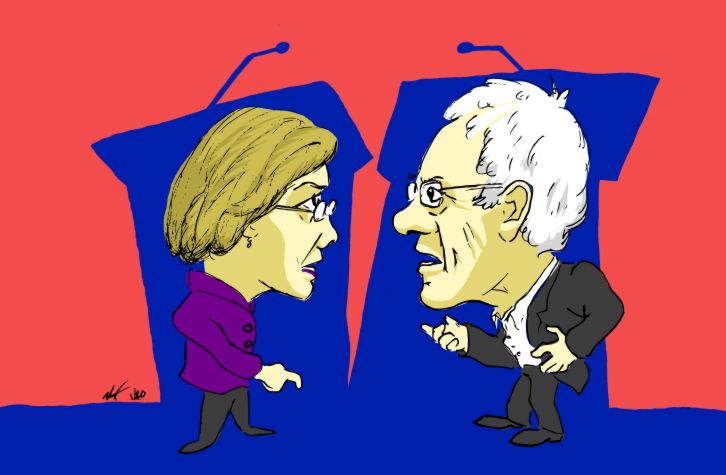Opinion: Sanders and Warren conflict highlights where political discourse falls short
Following roughly six months of network coverage, twitter punditry, and televised debates, the democratic race has seen a steady flow of polling-based speculation on which candidate might win the impending Iowa caucus. January’s recent Democratic debate, however, served mostly as a rehashing of arguments we’ve heard previously and served little purpose other than to center Democratic in-fighting in the public eye. I would argue that this month’s debate is a symptom of a much larger, more radical problem within political discourse.
Jon Favreau, for his second season of The Wilderness podcast, in which he explores the geographic and cultural landscapes that political candidates often traverse during election seasons, conducted a number of focus groups centering around policy, electability, and local sentiments surrounding voter efficacy. His focus groups are not exclusively geared toward registered democrats, which makes them a great gauge for where diverse samples of constituents fall when it comes to voting habits and political literacy.
Many people participating in a northeastern focus group vocalized their interest in specific policy focuses, including health care, the economy, and climate. However, when asked what they looked for in a presidential candidate, their answers had nothing to do with policy. Why is this?
We might consider the questions specifically aimed at inciting conflict between Senators Elizabeth Warren and Bernie Sanders, both considered to be major contenders in the Iowa caucus. On the eve of the January Democratic debate, Warren confirmed that Sanders had told her in 2018 that a woman could not win the nomination.
Immediately after asking Sanders if he had actually spoken those words to Warren, and subsequently listening to him deny Warren’s claims, the CNN moderator turned to Elizabeth Warren and asked her how she felt when he had said that to her – a slew of audience laughter followed the blatant dismissal of Sanders’ remarks.
I don’t think CNN’s refusal is funny. I don’t see a single party, platform, or voter that type of flippant and divisive framing benefits. I especially don’t see it contributing to political literacy among voters. Bringing up a potential conflict between candidates perpetuates the idea that electability should be based on characteristics that have nothing to do with policy beliefs. Questions like this inflate the myth that policy is passenger to rhetorical appeals.
I find political literacy to be increasingly relevant; it is what primarily stands out to me when watching these debates – while listening to moderators ask blunt questions – and while witnessing the democratic field continue to narrow as we approach the Iowa caucus.
Political debates are notoriously hollow of substance until after nominees are chosen because of how crowded the field can often be, and the Democratic debates are doomed to a series of surface-skimming statements until there are far fewer candidates vying for speaking time.
However, a key characteristic of these events is the host. These debates are hosted by networks and, lest we forget, networks are often beholden to viewership, ratings, shareholders, and the like. Whatever our opinions on the structure of modern media outlets, this remains the nature of common sources of political information. (ie. NBC, CBS, etc.)
Of the available trajectories CNN could have pursued, it chose to hover around domestic and foreign policy, while giving ample opportunity for candidates to attack opponents on the structure of their health care approaches – something we’ve seen throughout the race so far. The Iraq War was mentioned repeatedly as a frame for foreign policy decisions. NPR, in its recap of the debate, states that “Foreign policy became a principal issue for the first time,” but that couldn’t be further from the truth.
Recalling the previous debate in December, the war in Afghanistan, as well as general criticisms of the Obama administration, were a topic of discussion. Not only has foreign policy been a platform on which to compare all potential Democratic nominees to the incumbent president countless times before, but it has served to sow discord long before January’s debate stage. Instead of focusing on something new, CNN seemingly chose to harp on old arguments instead of fostering a new framing, and was even supported in this choice from another prominent voice in debate coverage.
Bringing up conflict between candidates can be a good way to incite discussion about what people-centered policy should look like, but inciting argument about a private conversation leads inevitably to arguments about electability. When asked the question about how she felt, Warren immediately pivoted to the electability of a woman in today’s race. This is not coincidence but rather a symptom of how decades of political discourse have primed us to see electability as simply a result of a candidate’s personal identity, rather than the substance of policy.
Not only did CNN moderators bring no new information forward with their questions, they allowed and encouraged Democratic in-fighting to overshadow the important content of each candidacy. I’m not convinced we, the people, learned anything new about what the remaining Democratic candidates truly stand for.
While I’m disappointed in how CNN handled its opportunity to moderate candidate discussion, Warren and Sanders have since come together – shaking hands and locking arms – in the possibility of keeping the party united as the Iowa caucus looms ever closer. My hope is that, as the race is concluded, collective political discourse will move away from he-said-she-said arguments around electability and instead focus on the feasibility of policy and the potential it has for impacting the lives of everyday Americans.
Note: The featured graphic does not necessarily reflect the opinions of its creator.

